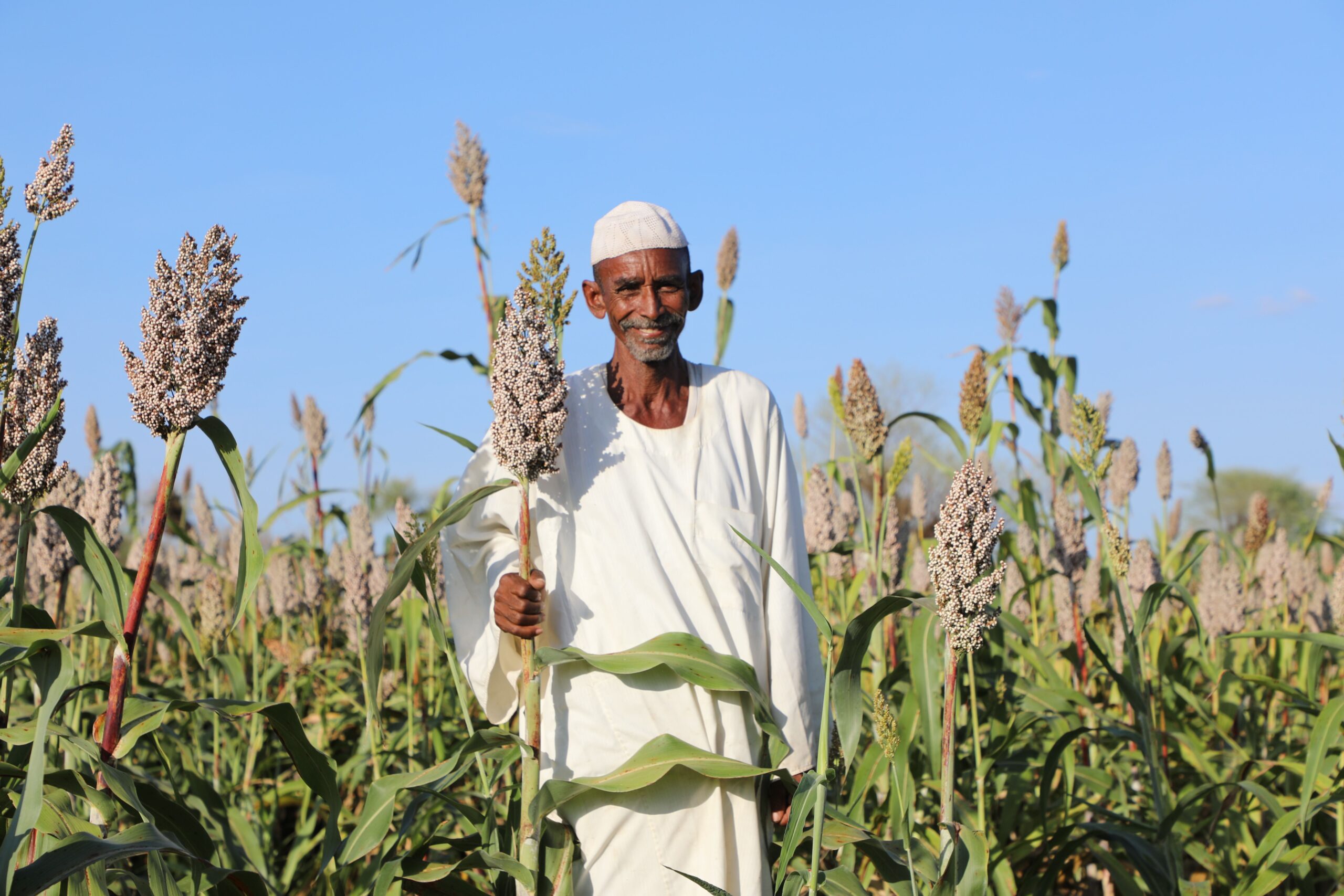In the shadow of war and a halted way of life, farmer Omar Goz, working in the Suki Agricultural Scheme in Sennar State, central Sudan, is preparing for his first farming season since the outbreak of conflict.
Burdened with fears of likely failure, Goz—like thousands of farmers in Sennar and Al Jazirah states—faces severe challenges, including the collapse of irrigation channels, halted financing, and an acute shortage of agricultural machinery and technology.
Despite the harsh conditions and the absence of basic farming necessities, Goz is determined to return to his land, which has been cloaked in the darkness of war for nearly two years. “It’s my only source of livelihood,” he told Ayin Network.
Mounting Challenges Threaten the Agricultural Season
As the summer farming season approaches, land preparation in Al Jazirah and Sennar—home to Sudan’s largest agricultural projects—remains minimal, threatening a significant reduction in cultivated areas. This grim reality contradicts earlier announcements by local governments touting their preparedness for the season.
A major concern for farmers is the lack of agricultural bank loans. Worries are growing that farmers burdened with pre-war debts will be denied new financing. To make matters worse, the Agricultural Bank has issued debt repayment notices and even imprisoned some farmers in Al Jazirah, according to Ayin’s findings.
The Heavy Legacy of War
Both Sennar and Al Jazirah were severely affected after Rapid Support Forces (RSF) invaded the regions in December 2023, halting nearly all agricultural activity. Widespread looting targeted equipment, fertilizers, pesticides, and even harvested crops. This loss, coupled with accumulated debt, has made it risky for farmers to return to their land—even after the Sudanese army regained control in certain areas.
Government Plans and Fragile Hopes
Attempting to address the crisis, the Sennar state government unveiled what it called an intensive plan for the 2025 agricultural season, describing agriculture as a gateway out of Sudan’s dire economic crisis. Sennar’s Minister of Production and Economic Resources, Engineer Al-Hadi Al-Sadiq, announced early preparations to ensure a successful farming season “despite the challenges.”
Suki Agricultural Project: Structural Failure
However, these official statements appear disconnected from realities on the ground. Goz highlights structural issues in the Suki project, especially the deteriorated irrigation system. “The project spans 124,000 feddans and depends on four outdated pumps from the 1970s,” he said. “New pump replacements were attempted, but they don’t meet specifications.”
“The main canals have collapsed, and the minor channels require cleaning. The entire irrigation system needs to be rebuilt. If the government wants to salvage this season, it must urgently rescue the irrigation network,” Goz emphasized.
He also pointed to funding barriers. “In 2022, a farmers’ initiative secured a trillion Sudanese pounds in loans from the Agricultural Bank for fertilizers and diesel. However, many beneficiaries weren’t real farmers and didn’t repay the loans. This blocked serious farmers from accessing financing now.”
Goz also criticized agricultural unions, accusing members of the former ruling National Congress Party of hijacking them since the 1990s to serve political interests rather than farmers’ needs.
Kasab Project: Unfulfilled Promises
The situation is equally dire in the Kasab Agricultural Project in Sennar. Farmer Abdel Ilah Al-Nour expressed frustration over the lack of preparations, especially in cleaning irrigation canals. “Sadly, the Blue Nile Irrigation Projects Administration and the state government have done nothing. The ‘Roweina’ pump is operational, but the infrastructure is entirely broken,” he said.
Al-Nour spoke of a vanished investor promise to fund operations due to rising costs. While farmers have cleared some lands themselves, “they’re waiting for any financial support, as they have no other income source.” Prepaid electricity fees further compound the burden.
Al Jazirah: Farmers Imprisoned Over Debts
In Al Jazirah, farmers face similar obstacles. Salman Al-Hadi from the Gezira Scheme reported that fear has gripped farmers as the Agricultural Bank demands repayment of pre-war debts—debts they couldn’t settle due to a failed harvest and RSF looting. “Some farmers in Al-Qurashi locality were jailed recently, and thousands more may follow, jeopardizing the entire season unless urgent measures are taken,” he warned.
The Gezira and Managil Scheme, established in 1925 and covering 2.2 million feddans, is one of Africa’s largest irrigation projects, sustaining millions of Sudanese.
Expert Opinions: Soaring Costs and Lack of Support
Agricultural engineer Mohamed Othman says a lack of financing and high input costs threaten food security. “Tractors are scarce, and diesel prices are rising,” he said. “Available loans come with harsh conditions from banks and companies, forcing farmers to scale back and focus on low-cost crops like sorghum—impacting diversity and yield.”
Engineer Tayeb Abdallah, head of an agricultural input company in Sennar, added that rapid currency devaluation has inflated input prices, causing huge losses for suppliers. “Fuel isn’t just expensive—it’s hard to obtain. Approvals for fuel use are another hurdle,” he added.
Systematic Looting and Ongoing Insecurity
Abdallah stressed that agriculturally rich localities like Dali, Al-Mazmum, Dinder, and Suki suffered massive looting of crops and machinery by RSF forces. “Irrigation systems were also vandalized. Areas like Dali and Al-Mazmum still suffer from insecurity due to their proximity to RSF-controlled zones,” he said, casting doubt on the upcoming season’s success.
A Glimmer of Hope Amid the Darkness
Despite this bleak picture, Abdallah believes that cotton will be planted on 400,000 feddans, and even larger areas of sorghum and sesame in Dinder, East Sennar, and Suki. “Some citizens remain hopeful—they’ve sold personal belongings to fund their farming. But the general trend is one of disruption in the agricultural cycle,” he concluded.
As farmers in central Sudan bravely strive to revive their lands, the absence of financial support, crumbling infrastructure, insecurity, and punitive lending practices threaten to turn their hopes into illusions. The coming agricultural season hinges on urgent and comprehensive interventions to salvage livelihoods and secure food for millions.
This report is published by the Sudanese Media Forum and its partner organizations, based on reporting by Ayin Network, to spotlight the challenges facing civilians in Al Jazirah as they work to revive agriculture.
